Alternative Ways to Say “Family Emergency”: A Comprehensive Guide
Understanding how to express the need to address a family emergency is crucial for effective communication in both personal and professional settings. While “family emergency” is a common and widely understood phrase, having a broader vocabulary allows for more nuanced and context-appropriate communication. This article delves into various alternative phrases and expressions that convey the…
